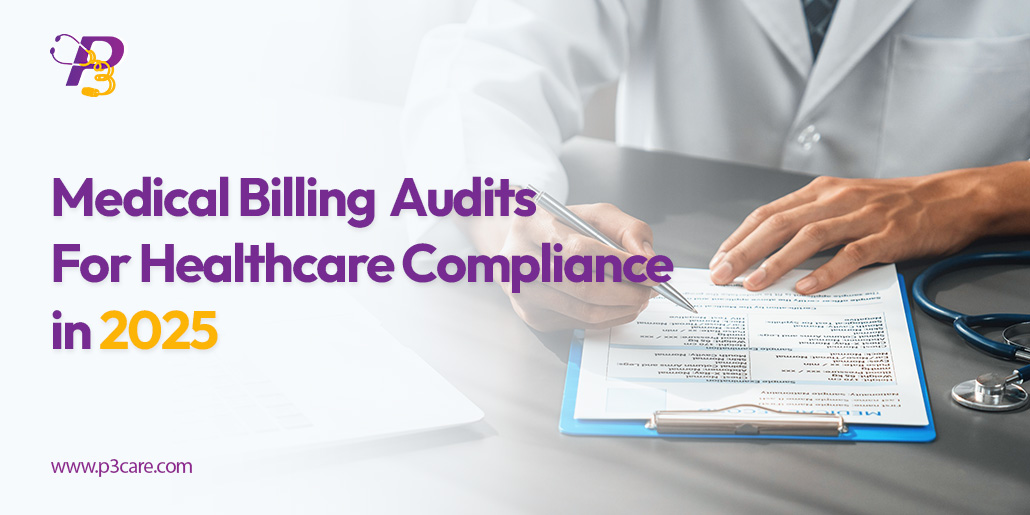

In today’s healthcare world, a single coding error isn’t just a mistake — it can lead to denied claims, lost revenue, or even government penalties.
Healthcare billing compliance is no longer optional in 2025. With CMS and private insurers increasing their audits, billing teams must follow strict documentation and coding standards. In fact, audit activity rose by 22% in early 2025, focusing on overpayments, incomplete records, and billing inconsistencies.
That’s why more providers are working with medical billing audit firms and medical coding audit companies to review their processes, catch issues early, and stay ahead of costly penalties. These audits are not just about spotting errors — they’re about strengthening the foundation of your revenue cycle.
By investing in regular revenue cycle management audits, practices can improve claim acceptance, reduce denials, and protect every dollar they’ve earned.
Healthcare audits are increasing — and 2025 brings stricter rules than ever. In 2024 alone, payer audits rose by 15%, and the pressure on providers is only growing.
With constant changes to coding systems and payer requirements, healthcare billing compliance has become harder to manage. Even small errors can lead to claim denials, payment delays, or penalties.
To stay compliant, many providers are now relying on medical billing audit firms and medical coding audit companies. These experts help identify issues early and reduce the risk of costly mistakes.
Routine revenue cycle management audits are also becoming essential. They review the full billing workflow to ensure accuracy and prevent revenue loss — a must in today’s complex environment.
By 2025, audits will have transitioned from being merely a formality — some organizations even consider them a nuisance — to an integral part of compliance with revenue protection. Each type of audit serves a purpose, and being aware of which technical terrain overlaps will help firms avoid costly mistakes.
This audit type examines if the medical records validate the codes that were billed. Medical coding audit firms will review charts to perhaps partially validate the codes submitted against the services provided. Since there are frequently updates to CPT and ICD-10 codes per annual revision, this type of audit is critical to adjusting to health care billing compliance.
These audits look at the submission process and claims prepared for submission. They can catch many issues, including a lack of required information, incorrect coding, and duplicate charges. These are routinely used in conjunction with routine revenue cycle management (RCM) audits to avoid denials and maximize payment processing time.
Compliance audits are a wider scope review of the billing process. Medical billing audit firms provide these audits to ensure compliance with payer rules and regulations, government regulations, and documentation regulations. Compliance audits reduced the risk of fines or scrutiny from a payer audit.
Payers are using increasing data to identify unusual billing patterns. In 2025, targeted audits (focused on providers with high volume or a pattern of billing that is obvious) will be the norm. A routine internal review will assist in finding deficiencies before a third-party audit.
In 2025, audits shouldn’t be occasional — they should be part of your routine. Regular revenue cycle management audits help catch errors early, improve claims, and keep cash flow steady.
The right partners make a difference. Medical billing audit firms can spot billing and compliance issues, while medical coding audit companies focus on code accuracy and documentation.
New billing tools offer support, but expert audits remain essential. When audits are part of your daily process, they reduce risk, protect revenue, and keep your team ready for anything.
In 2025, engaging an audit partner that suits your firm can not only protect revenue but also help maintain compliance. Here are some considerations to keep in mind:
Look for medical billing audit firms that are familiar with your specialty and payer mix. Their experience with practices like yours leads to more precise results.
Look for medical coding audit companies with certified coders and up-to-date knowledge of current coding rules. In 2025, frequent changes make this a must and p3care is the best partners you can trust on.
Inquire about the auditing process, reporting format, and feedback delivery method. A clear and structured procedure helps your team quickly act upon the suggested improvements.
Your audit partner should help strengthen healthcare billing compliance by identifying risks, not just pointing out coding mistakes. At P3Care, we have experts who deal with everything to make the process smooth
Don’t choose based on price alone. A quality partner helps you avoid denials and revenue loss, which saves more in the long run.
Outside firms often catch what internal teams miss. That’s why more providers include external audits as part of their regular revenue cycle management audits.
Keeping your practice audit-ready is simpler when you have a systematic approach. Follow this simple checklist to keep your practice compliant and on task throughout 2025.
Billing compliance will be essential to protecting your revenue and reducing unnecessary risk in 2025. Audits and coding rules are getting stricter and more numerous, and being ready is no longer optional.
Regular revenue cycle management audits, timely and accurate documentation, and documentation are equally as important as continuous maintenance of healthcare billing compliance. A consistent focus on each of these categories can be the difference between getting paid and losing revenue. For this reason, you’ll want to partner with reputable medical billing audit companies and professional medical coding audit partners.
Whether your practice is looking to reduce claim denials, improve compliance, or get ready to grow, reputable partners such as P3Care can provide the operational support you need. Trustworthy teams provide medical billing audit and medical coding audit support that ensures healthcare organizations are always on track and audit-ready throughout the year.
In 2025, there is increased enforcement from both payers and regulators focused on audit enforcement, especially related to telehealth, high-cost services, and outlier billing patterns. Even minor inaccuracies in billing or documentation can result in denials and/or penalties. Routine audits of the revenue cycle management will assist providers in remaining compliant and allow for uninterrupted payment.
At a minimum, medical coding audits should be completed quarterly – however high-volume or higher risk specialties may require monthly coding audits. Frequent audits help to ensure compliance with health care billing regulations, to identify coding errors early, and to prevent a loss of revenue due to claims being denied.
Internal audits are typically conducted by an in-house team for basic issues. External audits incur a cost, but they are unbiased and can provide an in-depth investigation into the billing process. External billing audit firms can identify broader trends or items out of compliance that a team might not see. This can be especially true and crucial in 2025 as the billing and coding changes evolve.
Yes, they are. Most denials occur due to an easily preventable issue — incorrect coding, missing modifiers, or insufficient documentation. Partnering with experienced firms, such as P3Care, is much more useful to providers, because it allows them to have their claims reviewed with greater accuracy and adjust their billing practices, thereby reducing the causes of the most frequent errors.
Medical coding audit companies should have certified coders, who know the payer rules, and have code compliance experience within your specialty. Inquire about their audit process, if they report correctly, and how they will assist in increasing your team’s accuracy. A quality partner identifies the errors and helps you address the issues causing the errors.
P3Care offers full audit support, from chart reviews to revenue cycle checks. Their team understands 2025 coding updates, payer changes, and audit risks. With customized solutions, they help practices improve healthcare billing compliance and stay audit-ready — while protecting revenue from avoidable denials or penalties.

